The Damning Myth of Spoken Word Radio: High Time Spent Listening (TSA) and Low Cume
By Walter Sabo
Consultant, Sabo Media
A.K.A. Walter Sterling
Radio Host, “Sterling On Sunday”
Talk Media Network
 Dependency upon a PPM panel to deliver high time spent listening is a bad business model. Would you rather count on one person listening for one hour or four people listening for 15 minutes? Right.
Dependency upon a PPM panel to deliver high time spent listening is a bad business model. Would you rather count on one person listening for one hour or four people listening for 15 minutes? Right.
A good music format program director knows exactly how to program talk radio in a PPM environment. Oddly, when a music programmer has the privilege of programming a talk station they seem to forget all of their programming knowledge. Both formats are measured by exactly the same technology and therefore if it “works” in music, it works in talk.
The reason “New Jersey 101.5” quickly became the highest cuming FM talk station in the world – for 20+ years – is because when Bob McAllan, Jay Sorensen, Perry Simon, John Dziuba and I designed it, we had a simple process: Build a music station that takes a lot of phone calls. It was always programmed like a top 40 station and 33 years later it obviously worked.
The reason “Real Radio 104.1 in Orlando” was the only Howard Stern station that did not suffer the expense of having to change format when he was recruited to SiriusXM Satellite Radio was because the station was built as a heavily formatted music station that took a lot of phone calls. Note that Real Radio 104.1 and New Jersey 101.5 both air music non-stop on the weekends for the single purpose of targeting a specific cume demographic. It obviously worked.
What are the key elements of a music format that should be applied to talk in order to build cume?
- Please, god, don’t flag the “breaks.”
- Every show had a specific pace based on topic set up time and call length time which gave the station a consistent rhythm and sound. All day.
- No “records” from home! No personal sound effects, jingles or that crap.
- Constantly sell ahead. No yesterday calls, yesterday references. Sell what’s next.
- Assume every single listener just tuned in. Explain the topic and give the phone number obsessively.
- Listener driven not host driven. Every host is valuable and gifted but if a host makes the mistake of quitting, the interest needs and tastes of the listener are constant and can be reflected by the next host. A constant.
Mickey Luckoff, the brilliant president of KGO, San Francisco for decades explained why he hired most of his hosts from top 40 radio because, “I can teach them TALK but I can’t teach them radio.” BTW yes, even 34-year morning host Jim Dunbar worked at WLS and KQV as a top 40 jock immediately before joining KGO to host a talk show.
Walter Sabo was a pioneer in the concept of targeted talk which allows a station to precisely reach a chosen demographic. He has had a robust list of consulting clients including, SiriusXM Satellite Radio, Conde Naste, CBS, Press Broadcasting, RKO General, Hearst, Fred Silverman Productions, and many more. His company HITVIEWS was the first major player to recognize and monetize online video stars known as “influencers.” He is on the nominating board of the Radio Hall of Fame. Reach him at 646.678.1110 or walter@sabomedia.com. Discover Sabo’s network radio show here: waltersterlingshow.com.



 Mentioning a local street name won’t do it. Constant local references is not LOCAL LIVE, it’s a GOOGLE MAP!
Mentioning a local street name won’t do it. Constant local references is not LOCAL LIVE, it’s a GOOGLE MAP!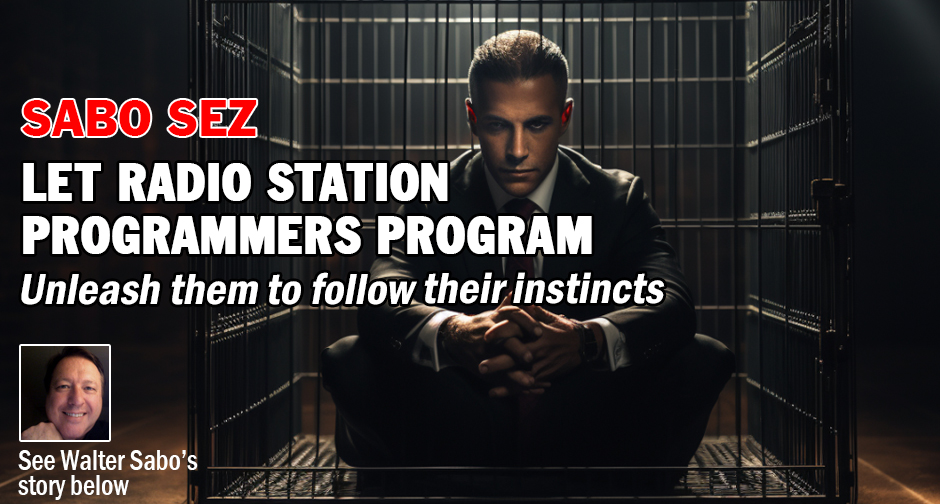
 HALF of all radio stations in the United States lose money – at least they did back in 1991. The NAB used to put out an annual report revealing how many radio stations were profitable. Usually half the stations in America lost money. Since consolidation, the NAB stopped putting out that report. It is reasonable to believe that far, far fewer stations lose money today. Shared costs, real estate, technical economies due to digital equipment versus analog all indicate that there must be fewer money-losing properties.
HALF of all radio stations in the United States lose money – at least they did back in 1991. The NAB used to put out an annual report revealing how many radio stations were profitable. Usually half the stations in America lost money. Since consolidation, the NAB stopped putting out that report. It is reasonable to believe that far, far fewer stations lose money today. Shared costs, real estate, technical economies due to digital equipment versus analog all indicate that there must be fewer money-losing properties. Amazing fact: In ancient times, from 1962-1972, the highest-paid on-air talent in New York City was “an overnight guy.” He was paid salary plus sales response. I’m talking about Long John Nebel on WOR, WNBC, then WMCA. Long John’s live reads moved product because his audience was captive. One-to-one his listeners were attached to their radios in the truck cab, night watchman’s building lobby, parents pacing with their babies, students cramming. His background was not in radio; he was a skilled auctioneer. Obviously, the same listeners exist today – and are anxious for someone to talk to them. Check out this old clip of Nebel in action:
Amazing fact: In ancient times, from 1962-1972, the highest-paid on-air talent in New York City was “an overnight guy.” He was paid salary plus sales response. I’m talking about Long John Nebel on WOR, WNBC, then WMCA. Long John’s live reads moved product because his audience was captive. One-to-one his listeners were attached to their radios in the truck cab, night watchman’s building lobby, parents pacing with their babies, students cramming. His background was not in radio; he was a skilled auctioneer. Obviously, the same listeners exist today – and are anxious for someone to talk to them. Check out this old clip of Nebel in action:  In the early 1980s, talk radio made a $4 billion mistake. Prior to then, there were approximately 50 full-time talk stations in America. They were predominantly found in major markets and had been in the format since Marconi. The original talk stations had two key traits: They were dominant in ratings and much of their popularity was driven by women hosts.
In the early 1980s, talk radio made a $4 billion mistake. Prior to then, there were approximately 50 full-time talk stations in America. They were predominantly found in major markets and had been in the format since Marconi. The original talk stations had two key traits: They were dominant in ratings and much of their popularity was driven by women hosts.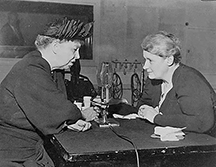 Then Mary Margaret read live copy. OR Mary Margaret had her guests read live copy. Sales for advertisers exploded. (Source: It’s One O’ Clock, Time for Mary Margaret McBride by Susan Ware
Then Mary Margaret read live copy. OR Mary Margaret had her guests read live copy. Sales for advertisers exploded. (Source: It’s One O’ Clock, Time for Mary Margaret McBride by Susan Ware 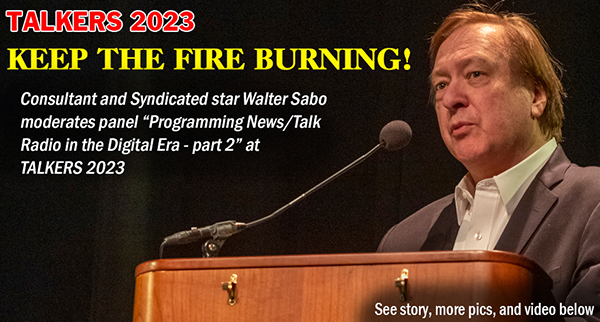
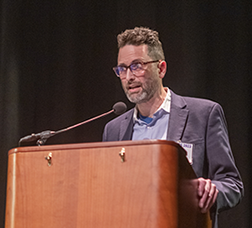 News/Talk Radio in the Digital Era – Part 2.” The session, sponsored by “Our American Stories,” is introduced by Alex Fife, VP operations, Southeast, iHeartMedia – Total Traffic & Weather Network (pictured at right) and moderated by Walter Sabo, CEO, Sabo Media and host (Walter Sterling) of Sterling on Sunday (pictured above). Panelists (pictured below from left to right) include Dan Mandis, program director and host, WTN-FM, Nashville; Ross Kaminsky, host KOA, Denver; Phil Boyce, SVP, spoken word format, Salem Media Group/ops VP, New York region/WMCA/AM 970; Josh Leng, CEO, Talk Media Network; and Matt Meany, program director, WABC, New York/Red Apple Media.
News/Talk Radio in the Digital Era – Part 2.” The session, sponsored by “Our American Stories,” is introduced by Alex Fife, VP operations, Southeast, iHeartMedia – Total Traffic & Weather Network (pictured at right) and moderated by Walter Sabo, CEO, Sabo Media and host (Walter Sterling) of Sterling on Sunday (pictured above). Panelists (pictured below from left to right) include Dan Mandis, program director and host, WTN-FM, Nashville; Ross Kaminsky, host KOA, Denver; Phil Boyce, SVP, spoken word format, Salem Media Group/ops VP, New York region/WMCA/AM 970; Josh Leng, CEO, Talk Media Network; and Matt Meany, program director, WABC, New York/Red Apple Media. 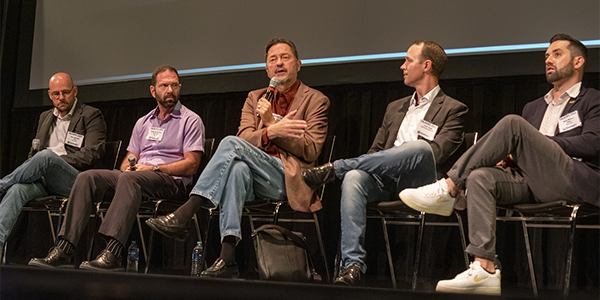
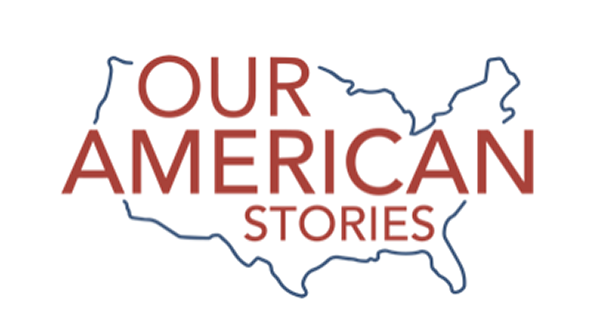
 It was a cruel trick. Hulu started streaming “For the People” from Shondaland Productions last month and I bit. It is a show about Manhattan, ambition and really well-tailored clothes. Then I looked at the more information tab and discovered that the show was cancelled… in 2018. Crushed. Two seasons on ABC. Cancelled.
It was a cruel trick. Hulu started streaming “For the People” from Shondaland Productions last month and I bit. It is a show about Manhattan, ambition and really well-tailored clothes. Then I looked at the more information tab and discovered that the show was cancelled… in 2018. Crushed. Two seasons on ABC. Cancelled. Oh, excuse me, hold on. Here it is! The hourly report from quasi research companies or real research companies like Nielsen declaring that radio is just fine, thank you! Massive surveys (choose one) reveal that radio works! Radio appeals to younger demos! Radio moves product! Radio has more listeners in AM drive than the “Tonight Show” has viewers! A landslide of data proves that after 100 years of success, radio is a viable medium.
Oh, excuse me, hold on. Here it is! The hourly report from quasi research companies or real research companies like Nielsen declaring that radio is just fine, thank you! Massive surveys (choose one) reveal that radio works! Radio appeals to younger demos! Radio moves product! Radio has more listeners in AM drive than the “Tonight Show” has viewers! A landslide of data proves that after 100 years of success, radio is a viable medium. It’s tough enough for radio talent to navigate stable careers in these days of consolidated station ownership, personnel cutbacks and drastic salary reductions – but the NAB’s newly stated stance on non-competes adds insult to injury and is out of step with the interests of beleaguered professionals still hanging on for dear life in the programming sector of this industry. I understand that the National Association of Broadcasters is at heart a lobbying group representing the interests of the medium’s ownership but, c’mon – non-competes really are of another era and egregiously unfair.
It’s tough enough for radio talent to navigate stable careers in these days of consolidated station ownership, personnel cutbacks and drastic salary reductions – but the NAB’s newly stated stance on non-competes adds insult to injury and is out of step with the interests of beleaguered professionals still hanging on for dear life in the programming sector of this industry. I understand that the National Association of Broadcasters is at heart a lobbying group representing the interests of the medium’s ownership but, c’mon – non-competes really are of another era and egregiously unfair. Surprisingly, my company Sabo Media has bought commercial time on radio stations. It’s a surprise because brands have come to us because the word “media” is in the name. Some brands think Sabo Media is a media buying company. Hysterical.
Surprisingly, my company Sabo Media has bought commercial time on radio stations. It’s a surprise because brands have come to us because the word “media” is in the name. Some brands think Sabo Media is a media buying company. Hysterical.